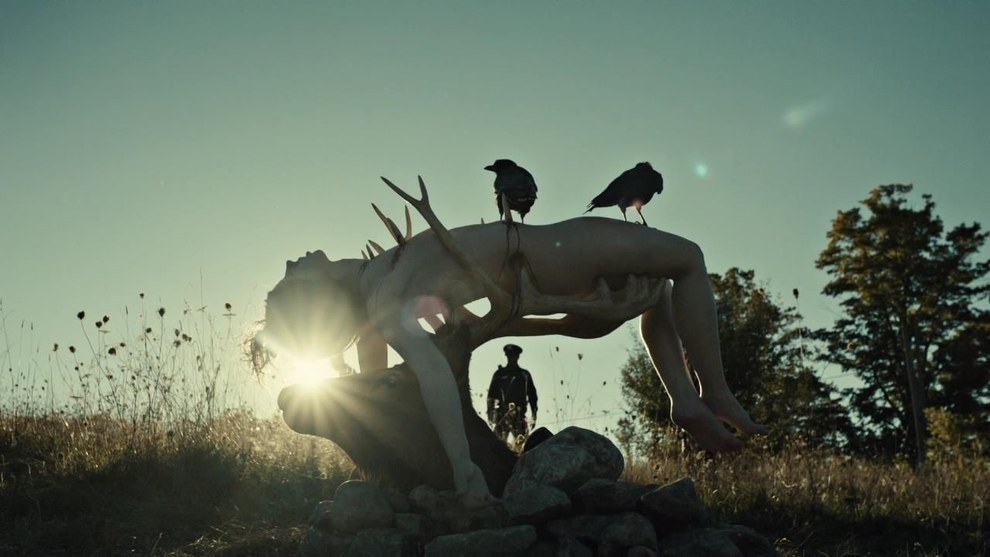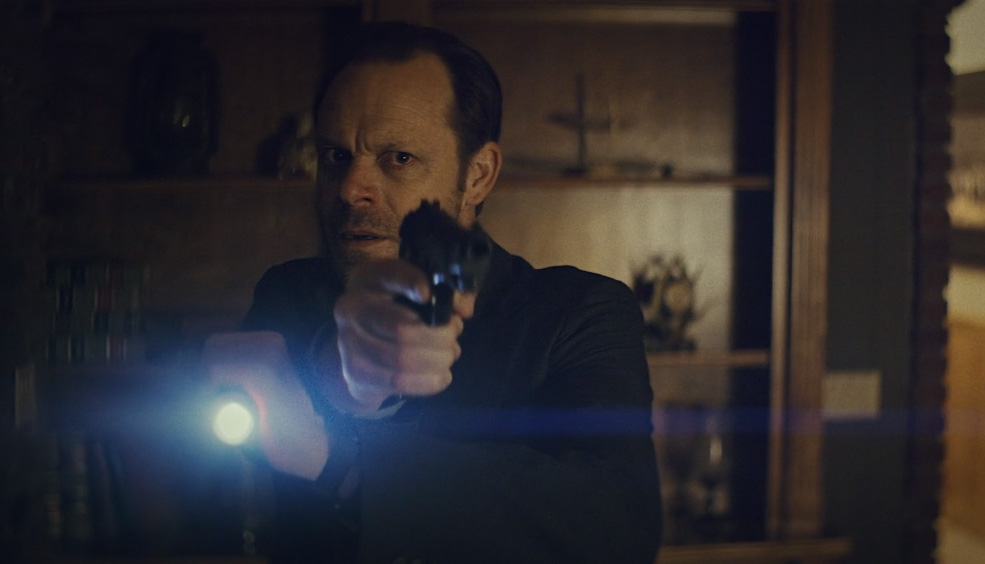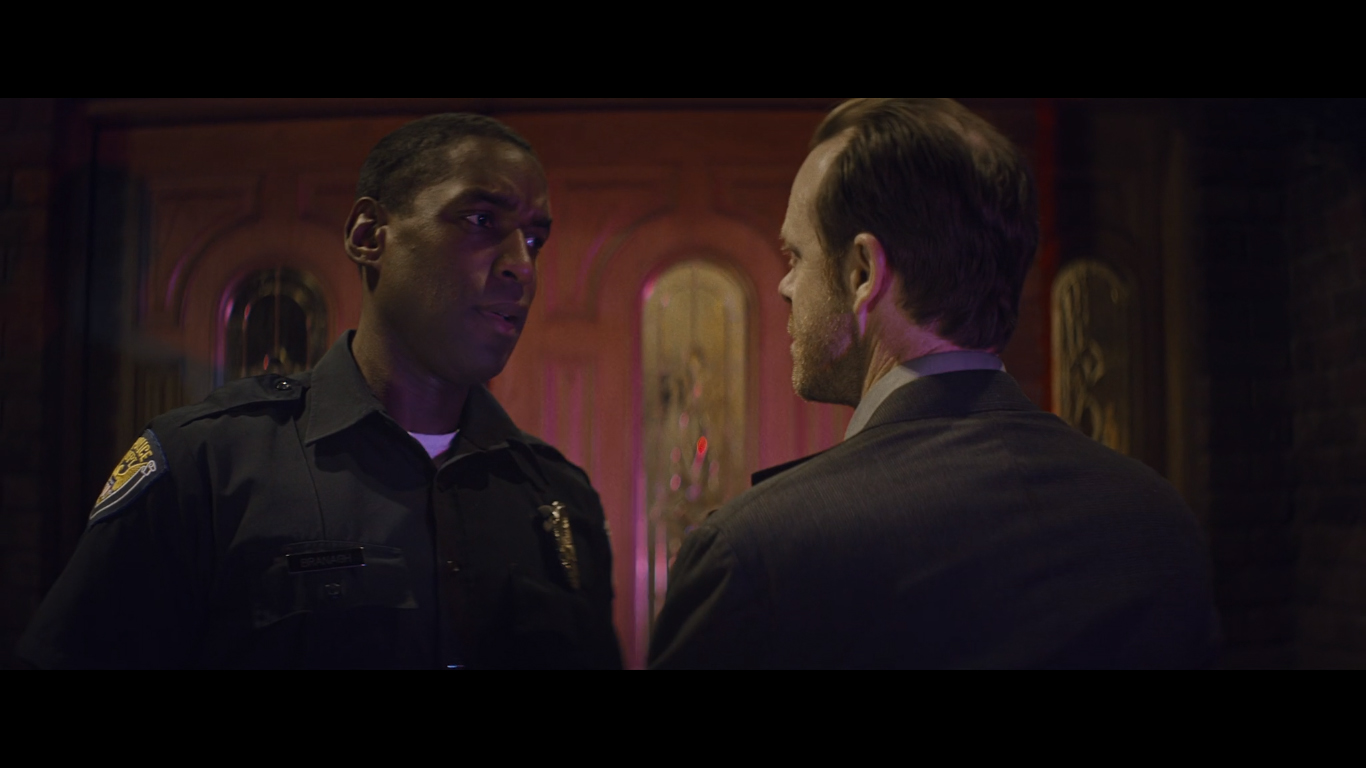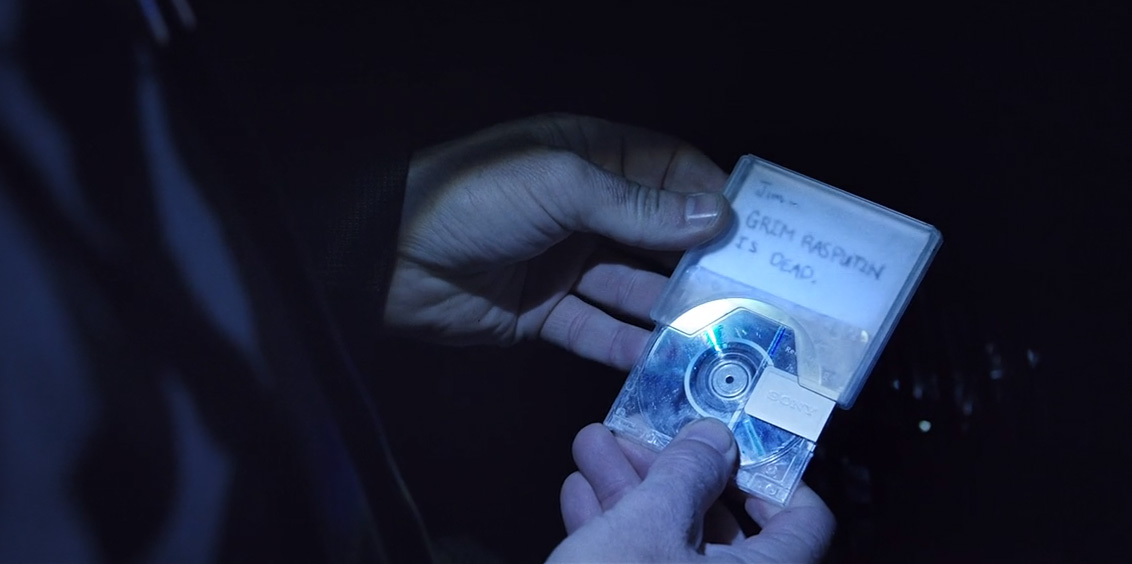Muitos fãs de Resident Evil ficara empolgados quando Shawn Lebert e a empresa Mance Media anunciaram que produziriam o seriado Arklay em 2014. O programa seria baseado ou inspirado em Resident Evil e teria como protagonista o detetive da RPD, James Reinhardt.
Três anos se passaram e Arklay não foi ao ar em nenhuma emissora de televisão ou sistema de streaming, mas Lebert divulgou uma amostra criativa do seriado – o curta DAVE. O filme não faz menção a nenhum elemento de Resident Evil diretamente, mas podemos perceber as referências da série de jogos no trabalho do produtor.
Em entrevista concedida ao REVIL, Shawn Lebert conta quais eram seus planos para o projeto e revela que se depender dele, Arklay ainda irá se tornar realidade. Por enquanto, o seriado sofre alguns obstáculos para se tornar um programa oficial sobre Resident Evil: os detentores dos direitos autorais da marca não demonstraram interesse na produção. No entanto, Shawn Lebert não pretende parar por aí. Ele ainda deseja lançar o seriado de alguma forma, nem que seja como uma “fã-serie”.
You can also check the interview in english below.
REVIL: A primeira pergunta pode parecer um pouco óbvia, mas precisamos saber isso: você é fã de Resident Evil? Já jogou os jogos?
Shawn Lebert: Eu sou fã da série desde 96. Eu lembro quando descobri o jogo em uma locadora. A capa chamou minha atenção e as imagens na parte de trás eram perturbadoras. Eu decidi experimentar mesmo sem saber nada sobre o game, e joguei boa parte da série. O primeiro facilmente se tornou um dos meus jogos preferidos de todos os tempos. Depois veio a sequência e eu amo os dois igualmente.
R: Resident Evil seria apenas uma inspiração ou Arklay seria 100% baseada nos jogos de Resident Evil?
SL: Seria um pouco das duas coisas. Depois de assistir ao seriado Hannibal, eu tive uma epifania e acho que a ideia [de fazer um seriado baseado em Resident Evil] foi fortalecida ainda mais depois que vi True Detective. Os estilos visuais das duas séries são maravilhosos e me pareceram totalmente representativos dos games – pelo menos, da forma como eu vejo. Outras inspirações incluem Alfred Hitchcock e David Fincher (em uma perspectiva mais contemporânea). Ambos fizeram coisas incríveis com o gênero investigativo.

Se Arklay vingasse, definitivamente seria baseada no universo dos jogos de Resident Evil. Há muitos detalhes ali que não foram totalmente explorados. Ainda, a conspiração contribui para fazer um ótimo drama e funciona muito bem para a televisão – com reviravoltas garantidas para várias temporadas. No entanto, as ideias para o seriado não são totalmente ligadas ao universo de Resident Evil e poderia ser algo completamente independente, se necessário. Existem algumas liberdades criativas que seriam usadas para manter o show novo e inesperado tanto para os fãs quanto para novos consumidores do público. Há uma mensagem contemporânea aí que ainda vale a pena ser explorada e que pode estar alinhada a Resident Evil ou com uma série completamente nova.
R: DAVE parece um drama policial de início, mas o roteiro se desenvolve para uma conspiração, até que vemos o primeiro zumbi. Quais eram os planos para o gênero da série (terror, drama, suspense)?
SL: O gênero de DAVE é uma miríade desses gêneros. Na verdade, essa mistura é uma forma de explorar a realidade da própria história. Minha intenção era focar nos detalhes dos personagens, mas ainda assim fazer terror. De certa forma, seria uma crise de identidade própria. Eu acho que um dos melhores exemplos para isso é Jurassic Park, que é adorado por transcender um gênero em outro. É assustador em alguns momentos e depois é engraçado. Acima de tudo, eu quero personagens realmente empáticos, por que quando eles são colocados em situações difíceis, você fica comovido e torce para que eles deem a volta por cima. Eu acredito que é por isso que as pessoas continuariam a assistir, por que elas se importariam com aquela jornada e se sentiriam parte daquilo.

Eu acho que parte da empolgação é saber que a história pode se desenvolver em gêneros diferentes, mas isto tem que encaixar no contexto da história. Você pode ter grandes momentos de ação de vez em quando, mas não podemos esquecer que todas as histórias geralmente contam algo sobre a humanidade de alguma forma em seu âmago. A conspiração é como a cereja do bolo. Para mim, a coisa mais surpreendente é não saber o que realmente está acontecendo no mundo – o que certamente pode ser algo bem assustador. Ainda, você não precisa ser literalmente um monstro para se tornar um.
R: De acordo com a sinopse inicial de Arklay, nós acompanharíamos a história do detetive James Reinhardt. Ele era ligado aos S.T.A.R.S ou membro do Departamento de Polícia de Raccoon City (RPD)? Haviam planos para trazer personagens dos jogos para o seriado?
SL: Se Arklay prosseguisse, James Reinhardt seria parte da RPD. Nós acompanharíamos os trabalhos internos da força policial e alguns personagens notáveis que só vimos de relance. Quais eram os planos do Delegado [Brian Irons]? E Marvin Branagh? Como era a cidade realmente, e a população? Veríamos tudo isso da perspectiva de Reinhardt. Há muito drama aí que vimos muito brevemente. Acho que seria muito legal ver isso. Quem não adoraria ver a fundação dos S.T.A.R.S? Reinhardt é só o começo.

R: E outros elementos do universo de Resident Evil: monstros, vírus, corporações maléficas e cenários conhecidos, como as ruas de Raccoon City?
SL: Acho que a série seria um complemento divertido dos jogos. Seria uma perspectiva única da franquia com mais temporadas para expandir em termos de locações e situações que seriam originais para o seriado, mas teriam paralelos interessantes no material já estabelecido [os jogos]. Sabe, aqueles momentos “aha!” que as pessoas adoram. Eu sei que estou sendo bastante vago aqui, mas é totalmente intencional!
Eu acho que há muito potencial na Umbrella e nos grandes mistérios que envolvem o que a empresa faz. Estamos vivendo uma época em que a manipulação do DNA e coisas como o CRISPR estão acontecendo; ou ações para curar o câncer podem soar como algo maravilhoso, mas que podem significar potencialmente agir contra a Mãe Natureza. Há muitas coisas positivas que incluem pontos negativos terríveis. É realmente uma grande pergunta filosófica que todos nós deveríamos estar nos fazendo. Parece até que Resident Evil estava 20 anos a frente de seu tempo, não é mesmo?
R: As primeiras notícias sobre Arklay surgiram na internet em 2014. Nós só vimos um pitch e uma sinopse breve do que o show poderia ser. Em que ponto estava a produção naquela época?
SL: Não tinha ido muito longe. O que vocês viram é o que foi feito. Era questão de esperar para ver qual seria a recepção e se alguém desejava dar continuidade ao projeto. Além daquilo, o resto incluía pesquisa para saber qual seria o direcionamento do programa e o que seria esperado pelo público.
R: Os fãs de Resident Evil ficaram muito empolgados com Arklay e também decepcionados com a notícia de que o seriado havia sido cancelado ou que não seria mais produzido. O que aconteceu?
SL: Meu trabalho era fazer o pitch do projeto e eu tinha alguns contatos que estavam disponíveis para ouvir a ideia e assistir à prova de conceito. Porém esta é uma daquelas coisas que exige que você seja super paciente, se mantenha resiliente e esperar pelo melhor. Havia uma pessoa que se tornou inflexível com a ideia e começou a gerar uma certa resistência. Tenha certeza que o projeto foi feito com todas as intenções possíveis de se tornar algo oficial e que fizesse parte do mundo de Resident Evil. No fim das contas decidiu-se que a ideia não iria adiante na época e isso estava além do meu controle.

R: Depois de DAVE e Arklay, quais são seus projetos para o futuro?
SL: Ainda estou me dedicando a lançar esta história, se tornando uma série oficial de Resident Evil ou não. Há muita coisa para ser contada mantendo ciência e tecnologia no foco. Como eu havia dito antes, essas ideias não estão completamente fechadas e dependentes de Resident Evil. Ainda pode existir de forma independente – estou trabalhando em um piloto de uma hora, além de um compêndio e arcos de história e de personagens para a série. Eu espero que vocês me acompanhem nessa jornada. Enquanto isso tudo está se desenrolando, estou planejando algumas coisas originais também.
R: No Brasil, nós temos uma expressão que diz “a esperança é a última que morre”. Ainda há esperança para Arklay?
SL: Nunca diga nunca. Eu estou “com o copo cheio” e vendo uma luz no fim do túnel. Vozes são poderosas e vocês podem ser ouvidos. Há muito amor por aí.
REVIL Interviews: Shawn Lebert, producer of Arklay and DAVE
REVIL: The first question maybe a little bit obvious, but I really need to ask this: Are you a Resident Evil fan? Did you play the games?
Shawn Lebert: I’ve been a fan of the series since ’96. I remember the time I came across the game in a rental store. The front cover piqued my interest and the images on the back were unsettling. I gave it a shot without knowing anything else about it. I’ve played through the majority of the series. The first one easily became one of my favorite games of all time. Then the sequel came. I love them both equally.
R: Resident Evil was just an inspiration for you or Arklay was going to be a show 100% based on Resident Evil games?
SL: It’s a little bit of both. Something clicked in my mind after watching the Hannibal television show and I then began to envision something. I think the idea concreted itself much more after seeing True Detective. Their visual styles are gorgeous. It was these styles that felt tonally representative to the video game series — at least, that’s how I see it. Other inspirations included Alfred Hitchcock and more contemporarily, David Fincher, who’ve both made great things with the detective genre.
If Arklay would take off, it definitely would have rooted itself in the Resident Evil game universe. There’s a lot of rich detail there left unexplored. Plus, the conspiracy makes for great drama and would work well with television with twists and turns for many seasons. However, the ideas are not completely dependent on the RE universe, it can be a separate entity if it needed to be. There are some creative liberties that would have been taken to keep it feeling fresh and unexpected for both the fan and new audience members. There’s a contemporary, grounded message in there that’s still worthy to explore and it can still be said with Resident Evil or as a completely original series.
R: DAVE looks like a police drama at first, but then the plot develops into a conspiracy and then we see the first zombie. What were the plans – regarding the focus – for the show’s genre (horror, drama, thriller…)?
SL: The focus for DAVE is a myriad of all these genres. It in fact crosses genres in order to explore the reality that it’s in. My intention was to focus its attention to character detail, but still be horror. In a way, it’s its own existential crisis. I think one of the best examples that does it well is Jurassic Park. It’s beloved because it transcends one genre with another. It’s scary one moment, then the next it’s funny. Ultimately, I want characters to really care for so when they’re put into these dire situations, you feel like you’re with them and root for them to come out on top. I feel that’s why people continue to tune in, because they care for the journey that also includes them.
I think part of the excitement is knowing that the story can evolve into different genres, but it’s gotta be deserved within the context of the story. You can have great action moments from time to time, but at the core of it, we musn’t forget all stories usually tell something about humanity in one shape or form. The conspiracy is the bread and butter. For me, the most startling thing is not knowing what’s really happening in the world and that can certainly be a scary thing. Also, you don’t literally have to be a monster in order to actually become one underneath.
R: Based on the show early synopsis we knew that the story would follow detective James Reinhardt. Was he connected to the S.T.A.R.S. or a member of the Raccoon City Police Department? Were there any plans to bring characters from the games to the show?
SL: If Arklay moves forward, James Reinhardt would have been part of the Raccoon City Police department. We would see the inner workings of the police force along with some notable characters who we’ve only seen glimpses of. What was the Chief up to? How about Marvin Branagh? What was the town really like, the town folk? You could see all that from Reinhardt’s perspective. There’s some great drama there that we only saw mere quick moments. I think it’d be really cool to see that. And who wouldn’t love being there for the inception and inauguration of S.T.A.R.S.? Reinhardt is just the starting point.
R: And how about other elements from the Resident Evil universe: the monsters, viruses, evil corporations, and its famous settings like the streets of Raccoon City?
SL: I feel like it’d be a fun companion series as the games’ counterpart. It would be a unique perspective on the franchise with more seasons to expand on locations and situations that – while original for the show – you can see interesting parallels from the established material, you know, those desirable ‘aha’ moments that people can appreciate. I know I’m being very vague here and it’s completely intentional!
I think there’s a lot of potential to talk about the company Umbrella and the massive gray area to do the things that it does. We’re living in a time where DNA manipulation, things like CRISPR are happening, the act of curing cancers — this all sounds wonderful, but what could potentially be the ramifications for going against Mother Nature itself? There are a lot of positives that also include some terrible negatives. It’s truly a bigger philosophical question we should all be having. It sure feels like Resident Evil was 30 years before its time, doesn’t it?
R: The first news about Arklay emerged online back in 2014. We only saw a pitch and a very brief synopsis of what the show would be. How far was it into production at the time?
SL: It wasn’t very far. What you saw is what you got. It was a matter of waiting to see how the reception was for it and if anyone wished to move forward. Aside from that, the rest is research for where the show can go, what can be explored and so forth.
R: Resident Evil fans were very excited about Arklay and became very disappointed with the news that the show was cancelled or wasn’t going to be produced anymore. What happened?
SL: My role was pitching the project and I had a few contacts who were available to listen to the idea, see the filmed proof of concept, but it’s one of those things where you have to be super patient, remain resilient and hope for the best. I had some who were adamant about the idea and it started getting some traction. Keep in mind, this was with the hopes that it has every intention of becoming an official thing if it were to be part of the Resident Evil world. Ultimately, it was decided it wasn’t going forward at the time and this was something beyond my control.
R: After Arklay and DAVE, what are your plans and projects for the future?
SL: Whether or not it gets picked up to become an official Resident Evil series, I’m still dedicated to bringing the story to light and what it means today. With science and technology being a major focus, there’s a lot to say. Like I said once earlier, these ideas aren’t completely fastened and dependent on Resident Evil. It can still exist independently—I’m working on an hour pilot, along with a mini bible and character/story arcs for the series. I hope you stick around for the journey with me. While that’s happening, I’m plotting out original features as well. Loving it!
R: In Brazil, we have a saying: “a esperança é a última que morre”, something like “while there’s life, there’s hope”. Is there any hope for Arklay?
SL: Never say never. I’ve got my glass half full and seeing light at the end of the tunnel. Voices are strong. You can be heard. There’s a lot of love out there.

